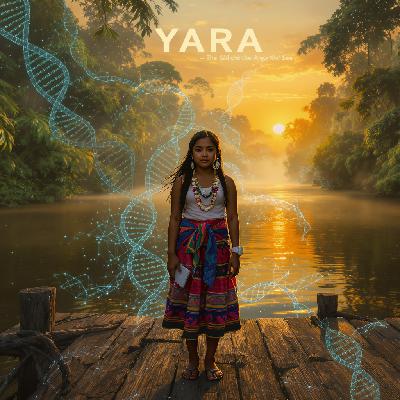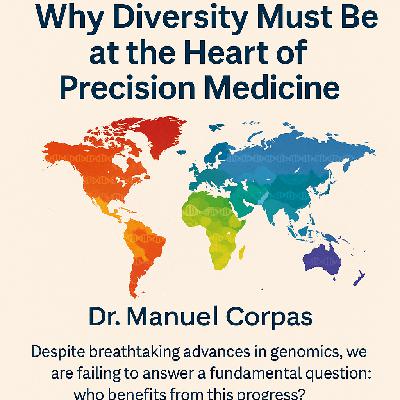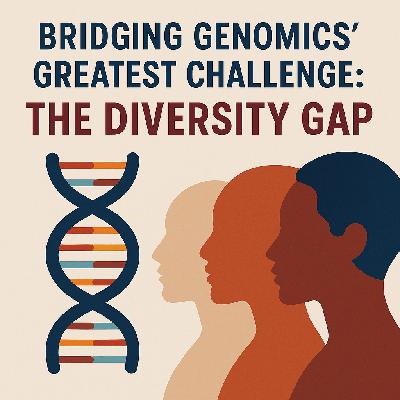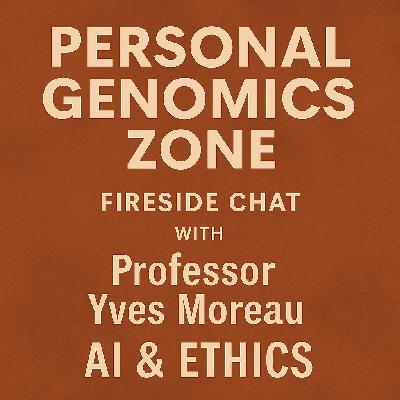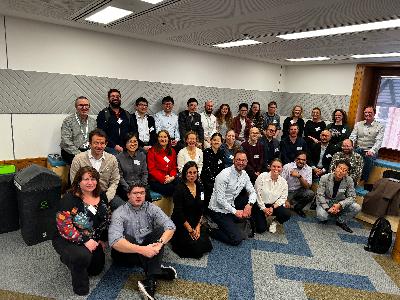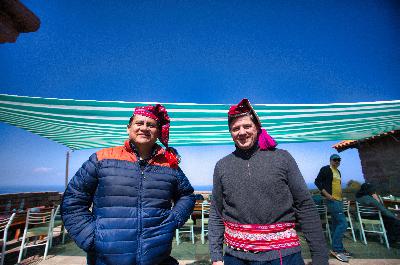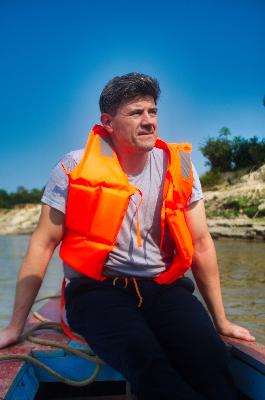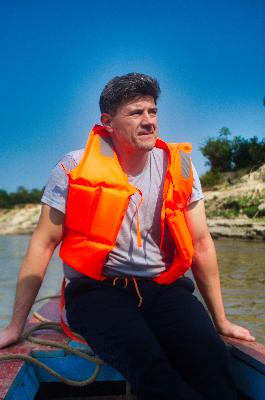My Journey with Social Responsibility and Diversity, Festival of Genomics, 2025
Description
Originally published by Frontline Genomics, the parent organisation of the Festival of Genomics and Biodata 2025.
<figure class="wp-block-embed is-type-video is-provider-youtube wp-block-embed-youtube wp-embed-aspect-16-9 wp-has-aspect-ratio">
<figure class="wp-block-audio"></figure>
FLG: Hi everybody. Today, we’re joined by Manuel Corpas from the University of Westminster, who will be joining us at The Festival of Genomics and Biodata in London in January. We’re really pleased to get some time with you today. For the benefit of our audience, would you be able to tell us a little bit about yourself and your career?
Manuel: Well, I’m obsessed with genomes. I’ve been obsessed at least since 2008 when, as a postdoc, I joined the Sanger Institute to help develop Decipher, one of the leading resources for rare genetic disease diagnosis. This formed the basis of a posterior project called DDD, Deciphering Developmental Diseases. This project sequenced 13,000 babies and children from the UK and Ireland in search for rare genomic disorders. It’s been one of the flagship projects from around the world in terms of our understanding of rare genomic disorders. After that, I started my own company called Cambridge Precision Medicine, which is part of the Cambridge University ecosystem. Then during the COVID pandemic, my wife said that she wanted to come closer to her family, so I moved to London and now I’m a Senior Lecturer in Genomics at the University of Westminster. I still have a kind of consultant role with Cambridge Precision Medicine, and I’m involved in a number of outreach projects from all over the world.
FLG: Sounds like you’ve had a really varied career. What initially sparked your interest in genomics, and bioinformatics in particular? You mentioned that you’ve been obsessed with it for a long time, but what triggered that for you?
Manuel: I did my PhD in bioinformatics at the University of Manchester. It was around classification of protein sequences, very much bioinformatics based, but I felt that the really exciting things were happening on the genomics side. Then I changed gears from proteomics into genomics in around 2008, when the first next generation sequencing technologies became available, and the first genomes sequenced became available. So, I made that transformation from array-based genotyping, into whole genome sequencing.
I also embarked on a series of crazy projects. I actually sequenced my genome and the genome of my family. I put it on the internet; it was probably the first family that made their whole genomes freely available for anyone to download. That sparked a publication on crowdsourcing the genomes of my family and trying to see the state of the art, because I’ve always been passionate about – the question that I’ve always had, I still have – to what extent do genomes actually inform our life choices, and how we can use this data to help us have better health.
At the time, when I was working at the Sanger Institute, which was pioneering their applications for patients, I could see how [it was] complicated, how much the clinicians and doctors struggled, and it was so bioinformatics based. I was passionate about trying to make sense of these big data sets. Then, that interest evolved into the Personal Genomes Project. After that, I became obsessed with how we bring all of these benefits that we Europeans are enjoying to the huge amounts of people from around the world who – because of maybe lack of infrastructure, or lack of the appropriate financing – are not benefiting from genomics. I’m now building an international research network around Latin American diversity genomes.
FLG: It certainly seems like the last couple of decades, at least, have been quite an exciting time to be involved in these fields. They’re adapting so quickly. But it doesn’t seem to necessarily translate into the clinic as quickly, and as you say, especially for non-European populations. So, how do you think we can go about bridging that gap between the research and the clinic, and how can the average researcher, in their day-to-day role, play a part in that?
Manuel: Obviously this is a very complex question, but I think that it’s taking its time, in a way, because we weren’t completely cognizant as to how complex this information was going to be, and how the different mechanisms that regulate heredity are incredibly convoluted. So, it’s that on one hand. On the other hand, I think it’s also access to technology. I mean, it’s not exactly cheap to sequence your genome. We saw that the prices dipped significantly in the late 2000s, but then that cost has kind of plateaued. I think that’s going to change very, very quickly now, and there are a number of contenders – some of them are actually exhibitors at The Festival of Genomics.
Then also, obviously, there’s the promise of long read. And some of the technologies are now able to produce, for the same price as you would do a whole genome, the methylation aspect. Looking at it from the inside, things have changed dramatically. When I did my first exome, which was around 2011, doing it from saliva was completely unheard of, and now this is kind of routine. That’s on the one hand, but I also have to say that I feel very lucky having been based in the UK, because it’s incredible how this genomic revolution has been led from here. You feel like you are really at the epicenter of where things are happening, with some incredible research, but also the companies around here. So overall, I also see new opportunities that are developing, a huge number of new roles and companies and so I have a huge number of expectations. It feels really, really exciting to be here and working in this field.
FLG: I think, of course, the scientific community has to be very involved in this shift from using European data sets to using more diverse data, and ensuring that the benefits are felt by everybody. But, of course, it’s not just the scientists involved in this. There are policymakers involved as well. How do you think that scientists and policymakers could work together to ensure that the benefits of this research can translate into better healthcare for people?
Manuel: I think from the scientific point of view, we have a tremendous responsibility. I’m going to say something that may sound a little bit controversial; I think we scientists can’t assume that our work is going to be trusted. We are in a new world – the world of social media and fake news – and there’s a huge amount of work on our part in terms of communicating transparently and making sure that we follow the utmost rigorous processes, ethical processes, in a transparent way, where we really are able to share with the public the benefits of our research. That’s one of the determinant ways of thinking in my own research. I can’t trust that people are going to necessarily trust what I’m doing. I need to earn their trust. So, that’s the very first thing.
Secondly, I think that we need to be aware of historical practices of exploitation, of genetic colonialism. We now live in the George Floyd world, where there have been critical acknowledgements of abuses in the past, and we have to be particularly sensitive about making sure that the values of equity, diversity and inclusion are, in my view, at the top. And at least in my research, these equity, diversity and inclusion efforts have been at the absolute top.
Then the other thing that I want to highlight is respect for different cultures, for different ways of interpreting science. Sometimes, because we are based here in the West, we think that our way is the way of doing things. And actually it’s not, not necessarily. So, I think there’s a lot of work to do on our part in terms of engagement with patients, but also with the communities that we want to serve. Not just from the point of view of paternalistic dialogue, it’s actually an engagement where we have a commitment, not just to make sure that we do the research, but also that we share the benefits and that what we are doing is truly relevant, not just for the few, but for the many. This is something that I personally take very seriously. And I think this is the flagship of where we need to look, in terms of spreading and making genomics more accessible to people from around the world.
FLG: I think that’s all really important. It’s something we should all take seriously


